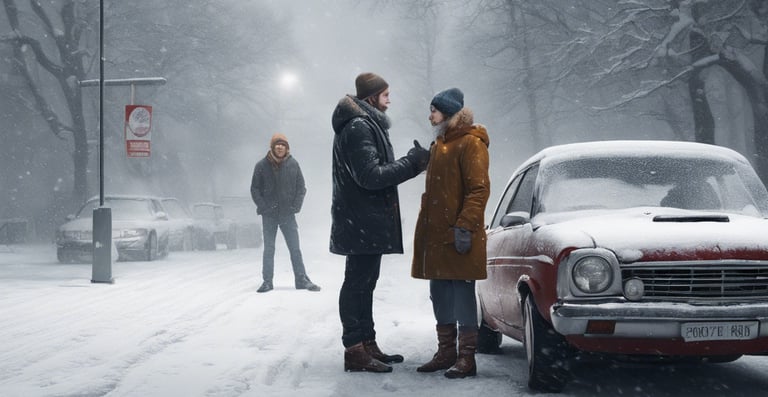The Case of Parking Space Squatter's Rights
This is the interesting Case of Parking Space Squatter's Rights - or to use its correct legal name - the case of Ostiguy v. Allie, a case decided by the Supreme Court of Canada in 2017. It is the story of two neighbours who owned adjacent ski chalets in the community of Bromont, Quebec and how they each laid claim to a disputed parking space. Their dispute would work its way through the court system, ultimately reaching the highest court in the land - the Supreme Court of Canada - in 2017, where the justices would ultimately put the matter to rest by reaching a decision on how acquisitive prescription (more commonly referred to as "squatter's rights") did or did not apply to the ownership of a parking space.


This is the interesting case of Parking Space Squatter’s Rights, or to use its correct legal name, the case of Ostiguy v. Allie.
The case involved neighbours who owned two ski chalets next to one another in the community of Bromont, Quebec. One chalet was owned by Ms. Hélène Allie and the other was co-owned by Mr. Alain Ostiguy and Ms. Valérie Savard. The case revolved around who was the rightful owner of a parking space and with the legal concept known in Quebec law as acquisitive prescription, or as many people have come to refer to it - “squatter’s rights.”
The case was decided in 2017 by the Supreme Court of Canada, but the story began years earlier.
In 1993, the husband of Ms. Hélène Allie purchased the chalet property and, starting in 1994, her family began parking in one or two parking spaces nearby. As it happens, these parking spaces were not actually on the property of Ms. Allie, but rather on the neighbour’s lot. However, nobody objected to Ms. Allie or her family parking there and she continued to do so without any dispute until 2011.
It was in 2011, that Alain Ostiguy and Valérie Savard purchased the neighbouring lot of land, the one where the parking spaces in question were located. On learning that Ms. Allie and her relatives were using the parking spaces, Mr. Ostiguy and Ms. Savard sent them a notice directing them to stop. The was soon followed up shortly afterwards by Mr. Ostiguy and Ms. Savard commencing a court action to seek an injunction prohibiting Ms. Allie from continuing to use the spaces.
Ms. Allie’s response to this legal action against her was to point out that, under Quebec’s Civil Code, a person who possesses property openly, peacefully and without any objection for 10 years can become its owner through acquisitive prescription. She therefore refused to stop parking there and, in addition, sought a ruling from the court to confirm her ownership of these parking spaces.
For their part, the lawyers representing Mr. Ostiguy and Ms. Savard pointed out that, while Article 2918 of the Civil Code of Quebec did acknowledge a person could acquire ownership through acquisitive prescription after 10 years, it also stated that this could only be done through a court judgment and Ms. Allie had never sought one, until now. They argued that this meant she could not now seek a judgment and have it applied retroactively.
In the adjudication that was to follow, much time would be spent on the interpretation of Article 2918. Many lawyers, including the legal team acting on behalf Mr. Ostiguy and Ms. Savard, took it at face value that a person could not acquire ownership through merely moving onto land and occupying it for 10 years, that Article 2918 required such a person to also go and get a court judgment before they could begin exercising any ownership rights and that such a judgment could not be applied retroactively. If that interpretation was correct, then Ms. Allie would be out of luck.
In 2013, the Quebec Superior Court ruled in favour of Ms. Allie, although they only found that she had proved her claim to one of the parking spaces in question. Unsatisfied with this outcome, Mr. Ostiguy and Ms. Savard appealed the decision and, in 2015 the Quebec Court of Appeal took the matter up for consideration.
The Court of Appeal also ruled in favour of Ms. Allie, by a 2 to 1 majority of the 3-justice panel which heard the case. Once again, Mr. Ostiguy and Ms. Savard appealed, and so the case ended up in the highest court in the Canadian legal system, the Supreme Court of Canada. In 2017, it was here that the Supreme Court of Canada – by 6 to 1 majority of its 7-justice panel – once again ruled in favour of Ms. Allie, confirming her ownership of the parking space.
When it came to the disputed interpretation of Article 2918, the majority of the Supreme Court ruled that taking an overly literal interpretation was the wrong approach. This was because, despite how it might appear on a surface reading, it was not the intention of lawmakers for Article 2918 to require a person to obtain a court judgment before they could exercise ownership rights under acquisitive prescription. Indeed, the majority opinion also noted that relying on an overly literal interpretation would cause other problems, as it would create inconsistencies with other parts of the Code.
For all these reasons, the majority decision of the Supreme Court was to find in favour of Ms. Allie, thus making it clear that, in Quebec, a person can acquire ownership of land by “peaceful, continuous, public and unequivocal” possession of the land for 10 years – even if the person never goes to court to get a judgment on the matter.
The decision in the Ostiguy case was received with surprise by some in the legal community. Stefan Fews, a lawyer with the firm of Strikeman Elliott LLP, when commenting on the case during a seminar in 2019, said real estate lawyers were shocked by the Supreme Court decision and that it would lead to increased anxieties between neighbours; as they would need to more carefully monitor the boundaries of their land to ensure that neighbours were not using portions of it, lest the landowner unintentionally end up losing ownership rights over those portions.
However, before landowners begin panicking, it is worth noting that the rulings of the courts in Ostiguy v. Allie may have limited application outside Quebec. This is because property law in Quebec is based on the civil code tradition, rather than the common law tradition used in the rest of Canada. Additionally, even in the provinces which share the common law tradition, they can and do change their laws dealing with property rights from time to time. For example, British Columbia and Alberta have both passed laws which completely abolish the ability of persons to claim property through adverse possession (which is the name used in the common law tradition for what is more-or-less equivalent to the acquisitive prescription concept in Quebec law). So, to put it simply, so-called “squatter’s rights” no longer exist in British Columbia or Alberta.
Therefore, not everyone who owns land across Canada needs to fear the possibility of losing their property to someone simply because they moved in and took it over and you failed to object. But, for those who happen to own land in Quebec or somewhere else that “squatter’s rights” are legally recognized, well perhaps it might be useful to double-check if anyone has been using your property and for how long.
SOURCES:
Gould, K. (2017, April 6). Supreme Court ruling: Possession is 9/10 of law -- even for parking spots. CTV News. https://montreal.ctvnews.ca/supreme-court-ruling-possession-is-9-10-of-law-even-for-parking-spots-1.3357430
Heath Law, Nanaimo Lawyers. (2017, September 6). Squatters Rights in British Columbia – Estate Litigation. Heath Law - Nanaimo Lawyers, Legal Services, Personal Injury Claims. https://www.nanaimolaw.com/squatters-rights-british-columbia-estate-litigation/
Hendrix, D. (2023, February 7). Did You Know That The “Squatter’s Rights” In Alberta Has Been Abolished? Hendrix Law. https://www.hendrixlaw.ca/did-you-know-that-the-squatters-rights-in-alberta-has-been-abolished/
Ostiguy v. Allie, 2017 SCC 22, [2017] 1 S.C.R. 402. https://scc-csc.lexum.com/scc-csc/scc-csc/en/item/16516/index.do
Strikeman Elliott LLP. [Strikeman Elliott]. (2019, February 28). The Real Deal on Real Estate in Quebec: Real Estate Considerations in Business Transactions [Video]. YouTube. https://www.youtube.com/watch?v=qUemdAbnfZ0

VLOG VERSION
